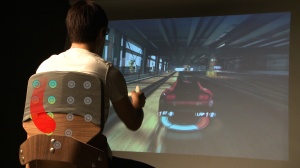 A new technology developed at Disney Research, Pittsburgh (DRP) is poised to usher in a brave new world of gaming. Called Surround Haptics, it allows game players (and film viewers, for that matter) to feel a wide range of sensations—from gentle caresses to bone-jarring collisions. Initially demonstrated during the Emerging Technology Exhibition at SIGGRAPH 2011, it was used to enhance a driving simulator, allowing drivers to feel road imperfections, skidding, braking, acceleration, collisions, jumping and landing, even objects striking the car. It’s all thanks to a gaming chair equipped with inexpensive vibrating actuators that transform digital information into physical sensation. Said Ivan Poupyrev, senior research scientist at DRP,
A new technology developed at Disney Research, Pittsburgh (DRP) is poised to usher in a brave new world of gaming. Called Surround Haptics, it allows game players (and film viewers, for that matter) to feel a wide range of sensations—from gentle caresses to bone-jarring collisions. Initially demonstrated during the Emerging Technology Exhibition at SIGGRAPH 2011, it was used to enhance a driving simulator, allowing drivers to feel road imperfections, skidding, braking, acceleration, collisions, jumping and landing, even objects striking the car. It’s all thanks to a gaming chair equipped with inexpensive vibrating actuators that transform digital information into physical sensation. Said Ivan Poupyrev, senior research scientist at DRP,
Although we have only implemented Surround Haptics with a gaming chair to date, the technology can be easily embedded into clothing, gloves, sports equipment and mobile computing devices. This technology has the capability of enhancing the perception of flying or falling, of shrinking or growing, of feeling bugs creeping on your skin. The possibilities are endless.”
Endless, indeed. The ability to feel within a game environment would radically alter the game experience—especially when you consider the implications for accessible games.
Of course, this sensory enhancement has other implications as well. It doesn’t take a genius to see how this could apply to adult-themed games—which brings a critical issue to light: when is a game no longer a game? Right now, virtual sex is limited to (for the most part) a visual and auditory experience, and the line between the game world and reality is pretty clear—though there are issues of betrayal and trust even with that. But what happens when you incorporate touch into the game, when you can actually “feel” your game partner? And what happens if you combine this with a virtual world like Second Life, where your game partner could easily be a real person at the other end of a network connection? If you’re single, it may not be that big a deal, but what about people who have partners in real life? Though there’s no direct contact between game partners, would such immersive virtual sex be considered cheating? Or, more simply, would the betrayal be any less real?
If the history of technological progress has taught us anything, it’s that once we develop the ability to do something, it’s impossible to prevent. Sooner or later, haptic systems will make the inevitable leap to the bedroom. It will be up to us—individually and as a society—to adapt to this new reality.
And there are darker ways this could go, but I’d rather not get into that.
To read the original article, click here.
For more on Surround Haptics, click here.
And for an overview of haptic technology, click here.
